Unit 3 知识要点
Unit 3 知识点详解

1.I’m going to exercise.我将要去锻炼。
exercise锻炼,动词;锻炼,名词exercise=take exercise=take some exercise锻炼2.Are you going to climb a hill?你将要去爬山吗?climb爬,及物动词climb a hill爬山3.You need to exercise and keep fit.你需要去锻炼和保持健康。
need需要,及物动词need to do sth需要去做某事need to exercise需要去锻炼keep保持,系动词fit健康的,形容词keep fit保持健康=keep healthy=stay healthy4.This hill isn’t as high as a real one!这座山没有真的山那么高!high高的,形容词as high as和...一样高(as...as中间加形容词的原形)not as high as不如,没有...高real真正的,形容词a real hill一座真正的山5.Let’s enjoy ourselves!让我们好好享受吧!let’s=let us让我们let让,及物动词let sb do sth让某人做某事Let us play together.让我们一起玩。
enjoy喜欢,享受,及物动词enjoy oneself好好享受,玩得开心enjoy yourself你自己玩得开心enjoy ourselves我们自己玩得开心6.Yesterday I took a boat trip under the famous Harbour Bridge and went past the Sydney Opera House.昨天我在著名的港湾大桥下乘船旅行,经过了悉尼歌剧院。
trip短途旅行,可数名词take a boat trip乘船旅行under在...的下面under the famous Harbour Bridge在港湾大桥下面go past经过=passthe Sydney Opera House悉尼歌剧院go past the Sydney Opera House=pass the Sydney Opera House经过悉尼歌剧院7.I’m having a great time in Australia!我在澳大利亚玩得很开心!have a great time=have a good time=have a nice time=have a wonderful time玩得很开心8.Take care!保重!care照顾,关怀,名词take care保重take care of...照顾...=look after...take good care of...照顾好=look after...welltake good care of yourself=look after yourself well照顾好你自己9.We’re sitting in a little coffee shop by the River Seine.我们正坐在塞纳河旁边的一个小咖啡馆里面。
七年级英语unit3知识点总结
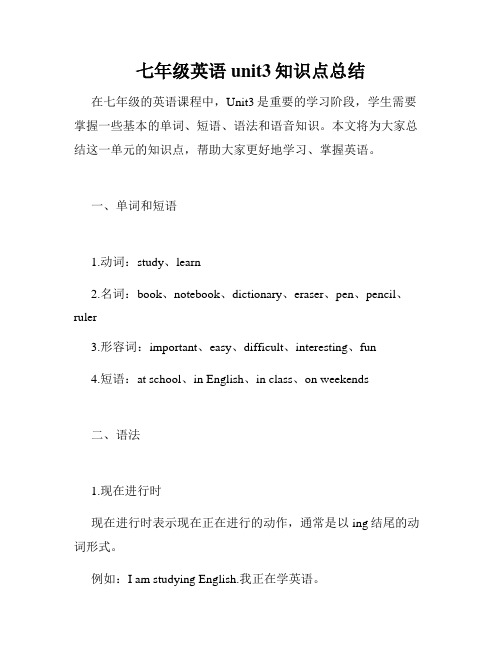
七年级英语unit3知识点总结在七年级的英语课程中,Unit3是重要的学习阶段,学生需要掌握一些基本的单词、短语、语法和语音知识。
本文将为大家总结这一单元的知识点,帮助大家更好地学习、掌握英语。
一、单词和短语1.动词:study、learn2.名词:book、notebook、dictionary、eraser、pen、pencil、ruler3.形容词:important、easy、difficult、interesting、fun4.短语:at school、in English、in class、on weekends二、语法1.现在进行时现在进行时表示现在正在进行的动作,通常是以ing结尾的动词形式。
例如:I am studying English.我正在学英语。
2.一般现在时一般现在时表示经常、习惯性地发生的动作或状态。
例如:I go to school every day.我每天都上学。
3.人称代词人称代词是表示人的身份的代词,用来代替某个人或一组人。
例如:I(我)、you(你)、he(他)、she(她)、it(它)、we(我们)、they(他们)。
三、语音1.长音和短音长音和短音是英语中的两种基本发音方式,必须掌握。
例如:cat(短音)、cake(长音)2.重读音节在英语单词中,有些音节的发音比其他音节更强烈,这种音称为重读音节。
例如:computer(com-PUT-er)以上就是七年级英语Unit3的主要知识点总结,希望本文对大家的英语学习有所帮助。
在学习英语的过程中,要积极听、说、读、写,多练习,做到理论与实践相结合,才能在英语学习中获得更好的成就。
人教版九年级英语unit3知识内容

人教版九年级英语unit3知识内容我们全都要从前辈和同辈学习到一些东西。
就连最大的天才,如果想单凭他所特有的内在自我去对付一切,他也决不会有多大成就。
下面给大家带来一些关于人教版九年级英语unit3知识内容,希望对大家有所帮助。
一.Unit3单词restroom [?restru:m] n.(美)洗手间;公共厕所stamp [st?mp] n. 邮票;印章bookstore [?bukst?:(r)] n. 书店beside[b??sa?d] prep. 在……旁边;在……附近postcard [?p?ustka:(r)d] n. 明信片pardon [?pa:(r)dn] v. 原谅 interj.请再说一遍 washroom [?w??ru:m] n. 洗手间;厕所 bathroom [?bɑ:θru:m] n. 浴室;洗手间 normally ['n?:rm?li] adv.通常;正常情况下 rush [r??] v. & n. 仓促;急促 suggest [s??d?est] v. 建议;提议 pass by 路过;经过 staff [sta:f] n. 管理人员;职工 grape [greip] n. 葡萄central [?sentr?l] adj. 中心的;中央的Nearby [?n?r?ba?] adj.附近的;邻近的 adv.在附近;附近 Pardon me 抱歉, 对不起;什么,请再说一遍 mail [meil] v. 邮寄;发电子邮件 n. 邮件 east [i:st] adj. 东方的;东部的adv.向东;n.东方 fascinating [?f?sineiti?] adj.迷人的;有吸引力的.Inexpensive[??n?k?spens?v] adj.不昂贵的Uncrowded [?n?kra?d?d] adj.不拥挤的;人少的convenient [k?n?vi:ni?nt] adj. 便利的;方便的 mall [m?:l] n. 商场;购物中心 clerk [kla:k][kl:rk] n. 职员corner [?k?:(r)n?(r)] n. 拐角;角落politely [p??laitli] adv. 礼貌地;客气地request [ri?kwest] n. 要求;请求direction [di?rek?n] [dai?rek?n] n. 方向;方位 correct [k??rekt] adj. 正确的;恰当的 polite [p??lait] adj. 有礼貌的;客气的 . direct [di?rekt, dai?rekt] adj. 直接的;直率的.speaker [?spi:k?] n.讲(某种语言)的人;发言者 whom [hu:m] pron. 谁;什么人 impolite [??mp??la?t] adj. 不礼貌的;粗鲁的address [??dres], [??dres] n.住址;地址;通讯处.Underground [??nd?ɡra?nd] adj.地下的;n.地铁 Parking lot n.停车场 course [k?:(r)s] n. 课程;学科 Italian [I?t?li ?n] adj.意大利\人的;n.意大利人\语 Tim [tim] 蒂姆(男名)二.Unit3知识梳理【重点短语】1.a pair of 一对,一双,一副2.between A and B 在a和b之间3.on one’s / the way to 在去……的路上4.pardon me 什么,请再说一遍5.pass by 路过经过6.look forward to 盼望期待7.excuse me 打扰了请原谅8.get some information about 获取有关……的一些信息9.turn left\right 向左\向右转10.go past 经过路过11.a little earlier 早一点儿12.a good place to eat 一个吃饭的好地方13.in different situation 在不同的情况下14.on time 准时按时15.get to 到达16.have dinner 吃晚餐17.on one’s / \the right在右边e on 快点请过来19.the shopping center 购物中心20.the corner of....... 的角落/拐角处21.lead into 导入,引入【重点句型】1.问路常用的句子:①Do you know where is … ?②Can you tell me how can I get to …?③Could you tell me how to get to …?④Could/Will/Would you please tell me sth. 表示十分客气地询问事情Could you tell me how to get to the park?请你告诉我怎么才能去邮局好吗?2. decide to do 决定做…...She decided to go to have lunch. 她决定去吃午餐。
Unit 3 单元知识速记-七年级上册英语核心知识归纳精练一遍过(人教新目标)

Unit 3 单元知识速记词汇精讲1. thisthis是指示代词,它的意思是“这个”,this一般指时间和距离比较近的人或者事物。
可以指代单数可数名词和不可数名词。
例如:This is a big tree. 这是一棵大树。
This is a piece of glass. 这是一块玻璃。
this 修饰单数可数名词时,名词前面不可以再有形容词性物主代词、冠词、所有格等修饰。
例如:This book is not mine. 这本书不是我的。
This girl is my sister. 这个女孩儿是我姐姐。
this 的复数是these。
例如:This is a pen. 这是一支钢笔。
These are pens. 这些是钢笔。
拓展:this 与thatthis指代离说话人较近的人、物、时间,也可以指说过或者做过的事。
打电话时可以用来介绍自己是谁。
例如:This is a beautiful garden. 这是一个漂亮的花园。
Hello, this is Jim speaking. 你好,我是吉姆。
that是远指,指离说话人较远的人、物、时间,也可以在打电话时用来询问对方是谁。
例如:That’s my classroom.那是我的教室。
Hello, this is Mary speaking. Who’s that? 你好,我是玛丽,你是谁?2. watchwatch作名词时,指戴在手腕上的手表,挂在胸前的怀表或者用来计时的秒表。
例如:I have a beautiful watch. 我有一块漂亮的手表。
拓展:watch还可以用作动词,意为“看,观看”;常用于观看动态的事物。
例如:watch TV 看电视watch a football game 看足球比赛3. callcall v. 打电话。
常见用法如下:(1)call sb. 给某人打电话例如:Please call me tomorrow. 明天请给我打电话。
九年级上册英语u3知识点
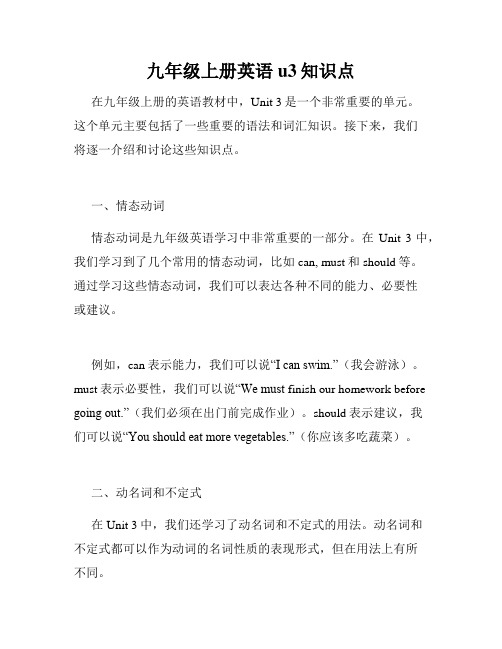
九年级上册英语u3知识点在九年级上册的英语教材中,Unit 3是一个非常重要的单元。
这个单元主要包括了一些重要的语法和词汇知识。
接下来,我们将逐一介绍和讨论这些知识点。
一、情态动词情态动词是九年级英语学习中非常重要的一部分。
在Unit 3中,我们学习到了几个常用的情态动词,比如can, must和should等。
通过学习这些情态动词,我们可以表达各种不同的能力、必要性或建议。
例如,can表示能力,我们可以说“I can swim.”(我会游泳)。
must表示必要性,我们可以说“We must finish our homework before going out.”(我们必须在出门前完成作业)。
should表示建议,我们可以说“You should eat more vegetables.”(你应该多吃蔬菜)。
二、动名词和不定式在Unit 3中,我们还学习了动名词和不定式的用法。
动名词和不定式都可以作为动词的名词性质的表现形式,但在用法上有所不同。
动名词通常以-ing结尾,可以作为主语、宾语或介词的宾语。
例如,“Swimming is my favorite sport.”(游泳是我最喜欢的运动)。
而不定式则以to加动词原形的形式出现,可以作为主语、宾语、表语或宾补。
例如,“To learn a second language is beneficial to our future.”(学习第二语言对我们的未来有益)。
三、虚拟语气在Unit 3的学习中,我们也接触到了虚拟语气的用法。
虚拟语气是英语中的一种特殊语法结构,用于表达与事实相反的假设、愿望或建议。
在虚拟语气的用法中,主要使用了虚拟条件句和虚拟结果句。
例如,“If I were rich, I would travel around the world.”(如果我有钱,我会环游世界)。
四、词汇积累在Unit 3中,我们还积累了大量的词汇。
人教版九年级全一册英语Unit3单元语法知识点总结
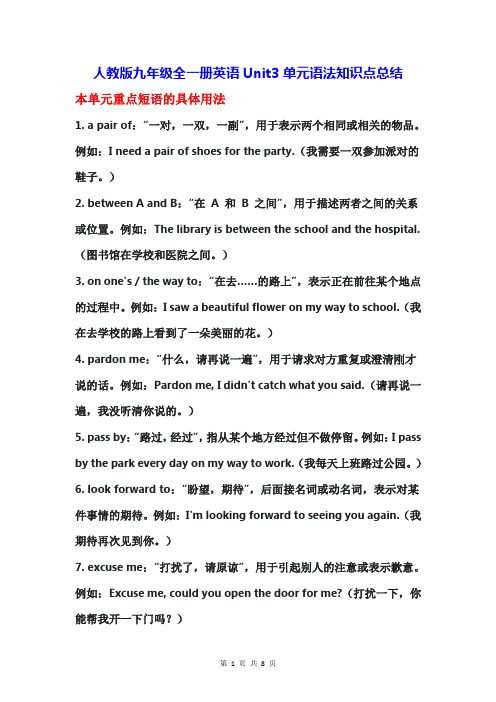
人教版九年级全一册英语Unit3单元语法知识点总结本单元重点短语的具体用法1. a pair of:“一对,一双,一副”,用于表示两个相同或相关的物品。
例如:I need a pair of shoes for the party.(我需要一双参加派对的鞋子。
)2. between A and B:“在A 和B 之间”,用于描述两者之间的关系或位置。
例如:The library is between the school and the hospital.(图书馆在学校和医院之间。
)3. on one's / the way to:“在去……的路上”,表示正在前往某个地点的过程中。
例如:I saw a beautiful flower on my way to school.(我在去学校的路上看到了一朵美丽的花。
)4. pardon me:“什么,请再说一遍”,用于请求对方重复或澄清刚才说的话。
例如:Pardon me, I didn't catch what you said.(请再说一遍,我没听清你说的。
)5. pass by:“路过,经过”,指从某个地方经过但不做停留。
例如:I pass by the park every day on my way to work.(我每天上班路过公园。
)6. look forward to:“盼望,期待”,后面接名词或动名词,表示对某件事情的期待。
例如:I'm looking forward to seeing you again.(我期待再次见到你。
)7. excuse me:“打扰了,请原谅”,用于引起别人的注意或表示歉意。
例如:Excuse me, could you open the door for me?(打扰一下,你能帮我开一下门吗?)8. get some information about:“获取有关……的一些信息”,用于表示获取关于某个主题的信息。
Unit3 My friends知识点归纳

Unit3 My friends知识点归纳二、单词1、my 我的2、friend朋友3、friends 朋友们4、she 她5、she’s=she is她是6、he他7、he’s =he is 他是8、am是is是are是9、too也10、this这,这个11、sister姐姐,妹妹12.goodbye 再见13. Tina蒂娜四、句型1. She’s Yang Ling .她是杨玲。
She’s my friend. 她是我的朋友。
2. He’s Mike . 他是迈克。
He’s my friend too. 他也是我的朋友。
3. See you next time .下次见。
4. This is Tina. 这是蒂娜。
She’s my sister.她是我的妹妹。
Hi , Tina .蒂娜,你好。
5. He is my friend, Mike. 他是我的朋友迈克。
6. Who’s she? 她是谁?She’s my friend, Yang Ling. 她是我的朋友杨玲。
7. Mike and Yang Ling are good friends. 迈克和杨玲是好朋友。
8. We are good friends. 我们是好朋友。
9.Goodbye, my friends. 再见,我的朋友们。
10. Sing the song with my friends. 和我的朋友们一起唱这首歌。
11. I can talk about my friends. 我会谈论我的朋友们。
五、复习巩固一年级上册Unit3 This is Miss LiMum, Dad, this is Miss Li.A: This is my cousin. B: She’s cute.A: Is this your mum? B: No. She’s my aunt.二年级上册Unit1 She’s my auntaunt 姑妈;姨妈uncle 叔叔;伯伯cousin 堂表姐妹tall高的short 矮的Mr Green格林先生二年级下册Unit4 I have big eyes结合本单元知识使用句型He / She has … eyes/ears/hair. He / She has a …mouth/nose/face. 描述五官。
unit3知识点
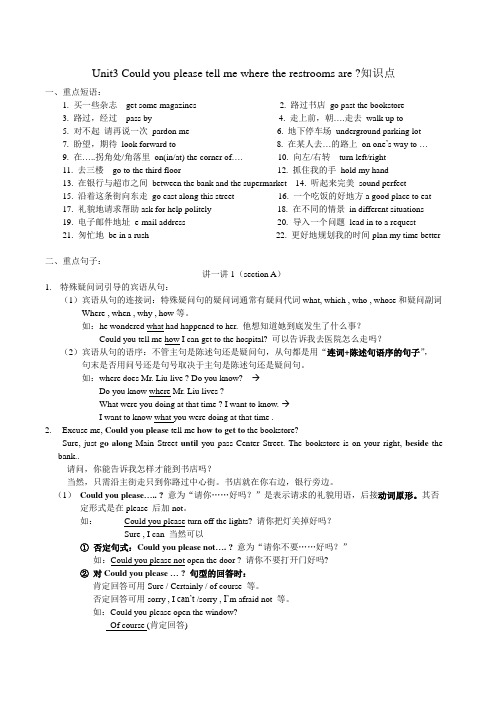
Unit3 Could you please tell me where the restrooms are ?知识点一、重点短语:1. 买一些杂志get some magazines2. 路过书店go past the bookstore3. 路过,经过pass by4. 走上前,朝….走去walk up to5. 对不起请再说一次pardon me6. 地下停车场underground parking lot7. 盼望,期待look forward to 8. 在某人去…的路上on one’s way to …9. 在…..拐角处/角落里on(in/at) the corner of…. 10. 向左/右转turn left/right11. 去三楼go to the third floor 12. 抓住我的手hold my hand13. 在银行与超市之间between the bank and the supermarket 14. 听起来完美sound perfect15. 沿着这条街向东走go east along this street 16. 一个吃饭的好地方a good place to eat17. 礼貌地请求帮助ask for help politely 18. 在不同的情景in different situations19. 电子邮件地址e-mail address 20. 导入一个问题lead in to a request21. 匆忙地be in a rush 22. 更好地规划我的时间plan my time better二、重点句子:讲一讲1(section A)1.特殊疑问词引导的宾语从句:(1)宾语从句的连接词:特殊疑问句的疑问词通常有疑问代词what, which , who , whose和疑问副词Where , when , why , how等。
如:he wondered what had happened to her. 他想知道她到底发生了什么事?Could you tell me how I can get to the hospital? 可以告诉我去医院怎么走吗?(2)宾语从句的语序:不管主句是陈述句还是疑问句,从句都是用“连词+陈述句语序的句子”,句末是否用问号还是句号取决于主句是陈述句还是疑问句。
江苏4年级英语Unit 3 知识点

Unit 3 知识点一、单词拓展twenty thirty forty fifty sixty seventy eighty ninety 二十三十四十五十六十七十八十九十(二)其余词汇1. sticker 贴纸2. can 能;可以;会3. very 很,非常4. beautiful 漂亮的5. sure 当然6. play 玩;打(球)7. many 许多8. box 盒子9. table tennis 乒乓球10. tennis 网球 11. but 但是 12. do 做;干13. crayon 蜡笔 14. robot 机器人 15. look 看上去;看起来16. library 图书馆 17. funny 有趣的;滑稽的 18. all 所有的19. take 花费 20. them 他们,她们,它们 (they的宾格)21. long 长的 22.count数数二、短语1. how many 多少2. my toy car(s) 我的玩具小汽车3. some sticker s一些贴纸4. how many stickers多少张贴纸5. have a look 看一看6. look at 看……7. very beautiful非常漂亮 8. many ball s许多球9. in that box 在那个盒子里 10. have fifteen stickers 有十五张贴纸11. play table tennis 打乒乓球 12. have one 有一个13. look so lovely 看起来如此可爱14.do this做这个15. in these boxes 在这些盒子里 16.the lion in the library在图书馆里的狮子17. seventeen purple grape s 十七个紫葡萄 18. eat them all 吃光它们19. all those cakes 所有的那些蛋糕20. so funny and lovely 如此有趣又可爱21. a ball under the desk 课桌下面的一个球 22. how long 多长;多长时间三、句型1. Look at my toy car s. 看我的玩具小汽车。
Unit3Englisharoundtheworld重要知识点梳理汇总
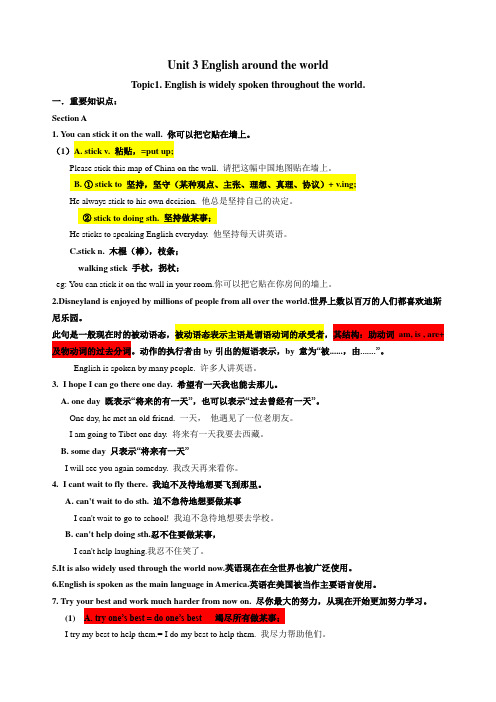
Unit 3 English around the worldTopic1. English is widely spoken throughout the world.一.重要知识点:Section A1. You can stick it on the wall. 你可以把它贴在墙上。
(1)A. stick v. 粘贴,=put up;Please stick this map of China on the wall. 请把这幅中国地图贴在墙上。
B. ① stick to 坚持,坚守(某种观点、主张、理想、真理、协议)+ v.ing;He always stick to his own decision. 他总是坚持自己的决定。
② stick to doing sth. 坚持做某事;He sticks to speaking English everyday. 他坚持每天讲英语。
C.stick n. 木棍(棒),枝条;walking stick 手杖,拐杖;eg: You can stick it on the wall in your room.你可以把它贴在你房间的墙上。
2.Disneyland is enjoyed by millions of people from all over the world.世界上数以百万的人们都喜欢迪斯尼乐园。
此句是一般现在时的被动语态,被动语态表示主语是谓语动词的承受者,其结构:助动词am, is , are+及物动词的过去分词。
动作的执行者由by引出的短语表示,by 意为“被......,由.......”。
English is spoken by many people. 许多人讲英语。
3. I hope I can go there one day. 希望有一天我也能去那儿。
A. one day 既表示“将来的有一天”,也可以表示“过去曾经有一天”。
人教版七年级英语上册unit 3句式讲解及知识梳理
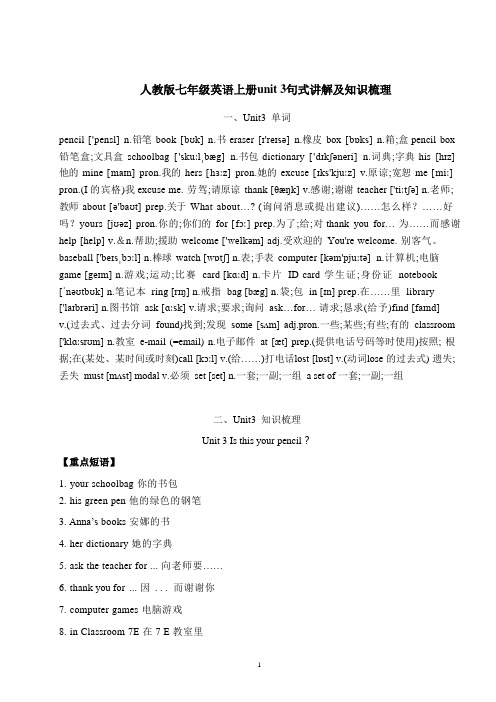
人教版七年级英语上册unit 3句式讲解及知识梳理一、Unit3 单词pencil ['pensl] n.铅笔book [bʊk] n.书eraser [ɪ'reɪsə] n.橡皮box [bɒks] n.箱;盒pencil box 铅笔盒;文具盒schoolbag ['skuːlˌbæg]n.书包dictionary ['dɪkʃəneri]n.词典;字典his [hɪz] 他的mine [maɪn] pron.我的hers [hɜːz] pron.她的excuse [ɪks'kjuːz] v.原谅;宽恕me [miː] pron.(I 的宾格)我excuse me. 劳驾;请原谅thank [θæŋk] v.感谢;谢谢teacher ['tiːtʃə] n.老师; 教师about [ə'baʊt] prep.关于What about…? (询问消息或提出建议)……怎么样?……好吗?yours [jʊəz] pron.你的;你们的for [fɔː] prep.为了;给;对thank you for… 为……而感谢help [help] v.&n.帮助;援助welcome ['welkəm] adj.受欢迎的You're welcome. 别客气。
baseball ['beɪsˌbɔːl] n.棒球watch [wɒtʃ] n.表;手表computer [kəm'pjuːtə] n.计算机;电脑game [geɪm] n.游戏;运动;比赛card [kɑːd] n.卡片ID card 学生证;身份证notebook [ˈnəʊtbʊk] n.笔记本ring [rɪŋ] n.戒指bag [bæg] n. 袋;包in [ɪn] prep.在……里library['laɪbrəri] n.图书馆ask [ɑːsk] v.请求;要求;询问ask…for… 请求;恳求(给予)find [faɪnd]v.(过去式、过去分词found)找到;发现some [sʌm] adj.pron.一些;某些;有些;有的classroom ['klɑːsrʊm] n.教室e-mail (=email) n.电子邮件at [æt] prep.(提供电话号码等时使用)按照; 根据;在(某处、某时间或时刻)call [kɔːl] v.(给……)打电话lost [lɒst] v.(动词lose 的过去式) 遗失;丢失must [mʌst] modal v.必须set [set] n.一套;一副;一组 a set of 一套;一副;一组二、Unit3 知识梳理Unit 3 Is this your pencil?【重点短语】1.your schoolbag 你的书包2.his green pen 他的绿色的钢笔3.Anna’s books 安娜的书4.her dictionary 她的字典5.ask the teacher for ... 向老师要……6.thank you for ... 因 ... 而谢谢你puter games 电脑游戏8.in Classroom 7E 在7 E 教室里9.in the school library 在学校图书馆10.call me 给我打电话11. call me at 495-3539 拨4 9 5 -3 5 3 9 打电话给我12.e-mail me at... 用……给我发电子邮件13.my school ID card 我的学生卡14.a set of keys 一串钥匙15. some keys 一些钥匙【重点句型】1.—What’s this? 这是什么?—It’s a watch. 一块手表。
九年级英语unit3最全知识点

九年级英语unit3最全知识点九年级英语 Unit 3 最全知识点英语作为一门重要的国际语言,在我们的学习生涯中起着举足轻重的作用。
在九年级英语教材中,Unit 3 是一个重要的单元,掌握好这个单元的知识点对于我们的英语学习至关重要。
下面,就让我们来一起回顾一下 Unit 3 的最全知识点。
1. 词汇Unit 3 的词汇积累是我们理解和掌握这个单元的基础。
在这个单元中,有一些常用的词汇需要我们牢记:harmful(有害的)、increase(增加)、decrease(减少)、pollution(污染)、environment(环境)、natural resources(自然资源)等等。
2. 语法在 Unit 3 中,我们学习了一些关于数字和数量表达的语法知识。
比如,我们要了解基数词和序数词的区别及用法;掌握“the + 序数词”的表达方式;学习并掌握正确表达分数和百分数的方法等。
3. 句型Unit 3 还包含了一些常用的句型,掌握好这些句型可以帮助我们更好地表达自己的观点。
比如,- It is important to do something.(做某事很重要)- The more..., the more...(越...越...)- It's time to do something.(是时候做某事了)- What can we do to protect...?(我们能做什么来保护...?)- We should take action to...(我们应该采取行动来...)4. 阅读技巧在 Unit 3 中,我们进行了一些阅读理解训练,学习了一些阅读技巧。
在阅读中,我们需要注意一些关键词的理解和记忆,比如表示因果关系的连词和短语,比如because(因为)、so(所以)、as a result(结果)、due to(由于)等等。
我们还需要学会根据文章的结构和组织方式,来理解文章的主旨和逻辑关系。
八年级上册英语Unit3重要知识总结
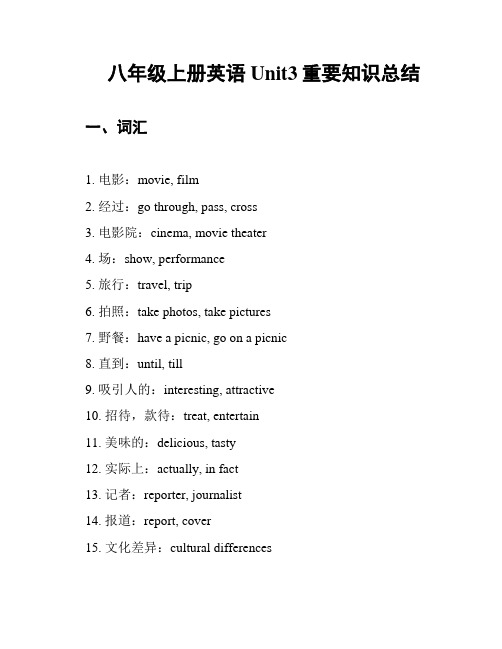
八年级上册英语Unit3重要知识总结一、词汇1. 电影:movie, film2. 经过:go through, pass, cross3. 电影院:cinema, movie theater4. 场:show, performance5. 旅行:travel, trip6. 拍照:take photos, take pictures7. 野餐:have a picnic, go on a picnic8. 直到:until, till9. 吸引人的:interesting, attractive10. 招待,款待:treat, entertain11. 美味的:delicious, tasty12. 实际上:actually, in fact13. 记者:reporter, journalist14. 报道:report, cover15. 文化差异:cultural differences二、句型和表达1. 这部电影非常有趣。
- This movie is very interesting.2. 我们经常一起玩。
- We often play together.3. 我们正计划去电影院。
- We are planning to go to the cinema.4. 他在电影院工作。
- He works at the movie theater.5. 我们要去看一场电影。
- We are going to watch a movie.6. 明天他们要去旅行。
- They are going to travel tomorrow.7. 我们在公园野餐。
- We are having a picnic in the park.8. 我一直等到他来。
- I waited until he came.9. 这个地方吸引了很多游客。
- This place attracts many tourists.10. 他拍了很多照片。
七年级下册英语unit3知识点总结

七年级下册英语unit3知识点总结Unit 3主要讲述了人们通过不同的方式交流信息,需要了解和运用一些相关的语言知识。
以下是本单元的知识点总结。
一、谈论天气1. 询问天气:What’s the weather like today? 或者How’s the weather today?2. 回答天气:It’s sunny/cloudy/rainy/windy/snowy.3. 谈论明天的天气:What’s the weather going to be like tomorrow? 或者 How will the weather be tomorrow? 表示未来的天气时,需要使用 be going to + 动词原形。
二、表达场所和方位1. 场所:school, hospital, library, park, cinema, supermarket 等。
2. 方位:in/on/under/near/in front of/behind/between 等。
其中,in 表示在场所内部,在图书馆等需要使用。
三、谈论时间1. 询问时间:What time is it? 或者 Can you tell me the time, please?2. 回答时间:It’s … past/to … 或者It’s … o’clock.3. 表示分钟:前面加 past,后面加分钟数;表示到几点,前面加 to,后面加下一小时的数字。
四、描述人物1. 人物外貌:tall/short, thin/fat, long/short hair, big/small nose, blue/brown/green eyes 等。
2. 人物性格:friendly/kind, funny/humorous, serious/shy 或者其他的形容词。
3. 人物喜好:like/love/prefer/ enjoy + 名词/动词ing。
三年级英语上册(精通)Unit 3必备知识点

三年级英语上册(精通)Unit 3 Toys必备知识点三年级英语上册(精通版)Unit 3 Toys的必备知识点可以归纳如下:一、词汇1. 玩具类词汇:ball:球doll:玩偶;玩具娃娃kite:风筝jigsaw:拼图;拼板玩具toy:玩具cat(toy cat):猫(玩具猫)dog(toy dog):狗(玩具狗)bike(toy bike):自行车(玩具自行车)bus(toy bus):公共汽车(玩具公共汽车)2. 其他常用词汇:this:这,这个(指示代词)mum:妈妈(非正式用语,美国常用mom)gift:礼物for:对,给(表示对象、用途等)Happy birthday!:生日快乐!so:很;极(修饰形容词或副词)cute:可爱的play with:玩……;和……一起玩good:好的;亲密的friend:朋友she:她(人称代词)has:有(用于第三人称单数代词、不可数名词或单数可数名词后)often:经常share:分享二、短语与句型1. 询问与回答:What's this? 这是什么?It's a ball. 它是一个球。
Look at my new doll. 看我的新玩偶。
2. 日常对话:Can I play with your toy cat? 我可以玩你的玩具猫吗?Sure, here you are. 当然,给你。
Happy birthday! 生日快乐!3. 描述性句型:It's so cute. 它太可爱了。
We often share our toys. 我们经常分享我们的玩具。
三、语法与用法1. this的用法:作为指示代词,用于指代较近的人或事物。
例如:This is my doll. 这是我的玩偶。
2. 名词的复数形式:doll →dollsball →ballskite →kitestoy →toyscat →catsdog →dogsbike →bikesbus →buses3. be动词的用法:在一般现在时中,be动词有am、is、are三种形式。
八年级下册人教版英语unit3知识点
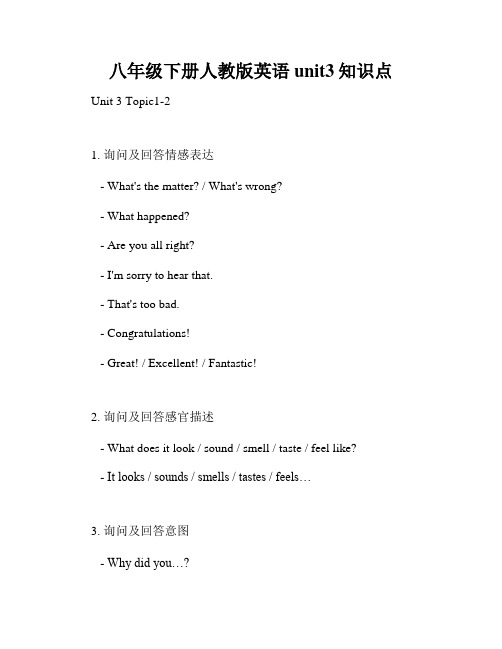
八年级下册人教版英语unit3知识点Unit 3 Topic1-21. 询问及回答情感表达- What's the matter? / What's wrong?- What happened?- Are you all right?- I'm sorry to hear that.- That's too bad.- Congratulations!- Great! / Excellent! / Fantastic!2. 询问及回答感官描述- What does it look / sound / smell / taste / feel like?- It looks / sounds / smells / tastes / feels…3. 询问及回答意图- Why did you…?- What are you going to …?- What do you intend to…?- I intend to… / I plan to…4. 问路及指路,口语表达中熟悉的方向词汇- Excuse me, could you tell me the way to…?- How can I get to…?- The nearest bus stop / subway station / bank / post office is… - It's on the left / right / opposite…Unit 3 Topic 3-41. 表达偏好及兴趣- Would you like…?- What kind of…do you like?- Do you prefer…to…?- I'm into…- I'm fond of…- I enjoy…2. 指出和辨认物品及人物(描述外貌和服装)- What does he / she look like?- He / She has…(描述头发颜色、眼睛、身材特征、穿戴等)3. 询问及描述活动安排- What are you going to do…?- What will you do…?- I'll…4. 描述天气- What's the weather like today?- It's sunny / cloudy / rainy / snowy / windy…- It's hot / warm / cool / cold…Unit 3 Topic 5-61. 表示和理解时间和星期- What time is it?- What's the date today?- What day is it today?- How many days are there in a week?- What do you usually do on weekends?2. 描述行程及活动- Tomorrow, I'm going to…(描述行程)- On Monday / Tuesday / Wednesday…, I usually… - In the morning / afternoon / evening / at night…, I…3. 询问及回答感受- How do you feel?- I feel…(描述感受)4. 描述位置- Where is the…? It's…(描述方位)以上是八年级下册人教版英语unit3的知识点总结,有效巩固这些知识点,可以让你在英语学习中更加得心应手。
人教版高中英语必修一名师精编:Unit3_必考知识点精讲
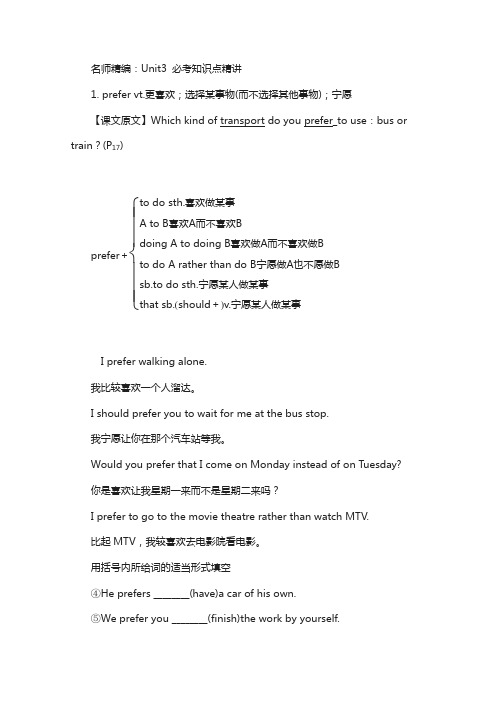
名师精编:Unit3 必考知识点精讲1. prefer vt.更喜欢;选择某事物(而不选择其他事物);宁愿【课文原文】Which kind of transport do you prefer_to use :bus or train ?(P 17)prefer +⎩⎪⎪⎨⎪⎪⎧ to do sth.喜欢做某事A toB 喜欢A 而不喜欢B doing A to doing B 喜欢做A 而不喜欢做Bto do A rather than do B 宁愿做A 也不愿做B sb.to do sth.宁愿某人做某事that sb.(should +)v.宁愿某人做某事I prefer walking alone.我比较喜欢一个人溜达。
I should prefer you to wait for me at the bus stop.我宁愿让你在那个汽车站等我。
Would you prefer that I come on Monday instead of on Tuesday?你是喜欢让我星期一来而不是星期二来吗?I prefer to go to the movie theatre rather than watch MTV.比起MTV ,我较喜欢去电影院看电影。
用括号内所给词的适当形式填空④He prefers ________(have)a car of his own.⑤We prefer you ________(finish)the work by yourself.⑥Tom prefers to meet his friend at the station rather than_______(wait)here.⑦My husband prefers staying at home watching TV to ______(go)shopping with me.⑧I prefer that you ________(keep) the secret for me.【答案】 ④to have ⑤to finish ⑥wait ⑦going ⑧keep2. persuade vt.说服,劝说【课文原文】Two years ago she bought an expensive mountain bike and then she persuaded me to buy one.(P 18)两年前她买了一辆很贵的山地车,然后她说服我也买了一辆。
Unit_3_知识点

11.besides adv.而且,况且,还有 prep.除...之外(还有) 易混辨析 besides,except,but,except for与except that/when 1)用亍否定句时,besides,except与but 可相互替换 No other students passed the maths exam except/besides/but Lin Tao and Wu Dong. 2)用于肯定句时的用法 a.besides表示"除了...以外,还包括..." Mr.Li knows three other languages besides English. b.except表示"除了...之外(不包括)" All of us went to the exhibition except Jack. c.but表示"除了...",与except意思相同。but常与不定代词连 用,如:something,anything,nothing,nobody,anybody,all等
即学即用 You had a party in Mary's.The party was____,wasn't it? C A funny B pleasure C fun D excited
13. it / one / that 易混辨析-1). 三者均可用作代词,指代前面提到的名词.一般说来,it指 代同名同物; one与that则指代同名异物。 I have lost my umbrella; I'm looking for it.(句中it就是指前 面的my umbrella) I have lost my umbrella; I think I must buy one.(one在句中表 泛指, 因为my umbrella已经丢了) The umbrella you bought is cheaper than that I bought. (替代词that在句中特指“the umbrella I bought”,以区别 “the umbrella you bought”)
八年级初二英语unit3知识点
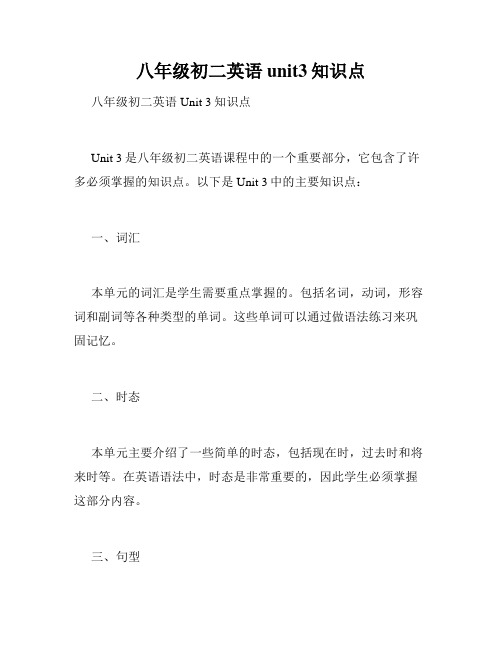
八年级初二英语unit3知识点八年级初二英语Unit 3知识点
Unit 3是八年级初二英语课程中的一个重要部分,它包含了许多必须掌握的知识点。
以下是Unit 3中的主要知识点:
一、词汇
本单元的词汇是学生需要重点掌握的。
包括名词,动词,形容词和副词等各种类型的单词。
这些单词可以通过做语法练习来巩固记忆。
二、时态
本单元主要介绍了一些简单的时态,包括现在时,过去时和将来时等。
在英语语法中,时态是非常重要的,因此学生必须掌握这部分内容。
三、句型
本单元主要介绍了一些基本的英语句型,例如祈使句,疑问句等。
学生需要掌握这些句型,并且在实际使用中熟练运用。
四、语法
本单元主要介绍了几种基本的语法规则,包括名词性从句,简单句,复合句等。
语法规则是英语学习的重点,因此学生需要认真学习这部分内容。
五、阅读
阅读是学习任何语言都必须掌握的技能之一。
本单元提供了一些适合初学者阅读的材料,学生需要通过阅读来提高自己的英语水平。
六、写作
本单元还包括一些写作练习,例如写作话题和写作明信片等。
这些练习是帮助学生提高编写英语文章的能力,并通过书写来加深对词汇和语法的理解。
综上所述,Unit 3是八年级初二英语学习的重要部分,它包含了许多必须掌握的知识点。
学生需要耐心学习并反复练习,以便更好地掌握这些知识点并提高自己的英语水平。
(完整版)英语必修三unit3知识点总结
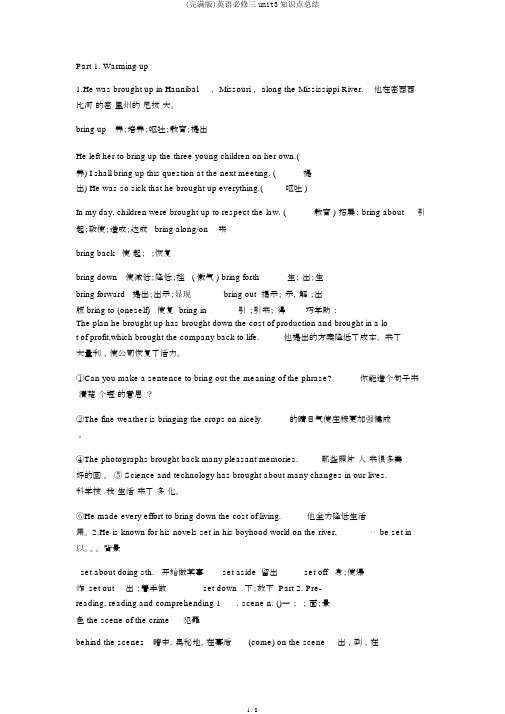
Part 1. Warming up1.He was brought up in Hannibal,Missouri,along the Mississippi River.他在密西西比河的密里州的尼拔大。
bring up养;培养;呕吐;教育;提出He left her to bring up the three young children on her own.(养) I shall bring up this question at the next meeting. (提出) He was so sick that he brought up everything.(呕吐 )In my day, children were brought up to respect the law. (教育 ) 拓展: bring about引起;致使;造成;达成 bring along/on 来bring back使起;;恢复bring down使减低;降低;挫 ( 傲气 ) bring forth生;出;生bring forward 提出;出示;显现bring out 揭示;示,解;出版 bring to (oneself) 使复 bring in引;引来;得巧学助:The plan he brought up has brought down the cost of production and brought in a lot of profit,which brought the company back to life.他提出的方案降低了成本,来了大量利,使公司恢复了活力。
①Can you make a sentence to bring out the meaning of the phrase?你能造个句子来清楚个短的意思?②The fine weather is bringing the crops on nicely.的晴日气使庄稼更加强健成。
- 1、下载文档前请自行甄别文档内容的完整性,平台不提供额外的编辑、内容补充、找答案等附加服务。
- 2、"仅部分预览"的文档,不可在线预览部分如存在完整性等问题,可反馈申请退款(可完整预览的文档不适用该条件!)。
- 3、如文档侵犯您的权益,请联系客服反馈,我们会尽快为您处理(人工客服工作时间:9:00-18:30)。
Unit 3 My day
一、语音
E e /ee /i: / Who are we? Tom, Jack and me. We meet Miss Li at three.
me, she, green, sleep, three, he, these, see, fifteen
二、单词,
(四会) 1. usually 通常、常常2.homework 回家作业3.morning 早晨,上午
4. afternoon 午后,下午
5.evening晚上,傍晚
6.watch 观看
(三会)7. lunch 午饭8. dinner 晚餐,正餐9. night 夜晚,晚上
三、词组
(四会)1. my day我的一天 2.get up at seven 在七点起床
3.go to school at seven forty在7:40去上学
4.have four lessons有四节课
5 in the morning上午 6.have lunch at twelve在十二点吃午饭
7. in the afternoon在下午8. go home at four forty在四点四十回家
9. do my homework做我的家庭作业10.at five thirty在五点三十分
11. have dinner 吃晚饭12. at six fifteen 在六点一刻
13. watch TV at seven在七点看电视14.go to bed at nine 在九点去睡觉
15.in the evening在晚上16. at night在夜里
(三会)17. every day每天18. seven o’clock 七点整
18. over there 在那边20.a big cake 一个大蛋糕
21.meet Miss Li at three在三点遇到李老师22. have breakfast 吃早饭
四、句型
(四会)1. When do you get up every morning? I get up at seven.
你每天早上什么时候起床?我在7点起床。
2. When do you do your homework every day? I do my homework at five thirty.
你每天什么时候做你的家庭作业?我在5:30做家庭作业。
3. I usually go to school at seven forty in the morning. 我通常在早上7:40去上学。
4. I play football at four and go home at four forty.我在4点踢球并在4:40回家。
5. I usually have dinner at six fifteen and watch TV at seven.
我通常在6:15吃完饭并在七点看电视。
6. I go to bed at nine every day. 我每天9点睡觉。
(三会)7. What can you see over there? 在那边你能看见什么?I can see a cake. 我能看见一个蛋糕。
8. I’m hungry. 我饿了。
I’m thirsty. 我渴了。
I’m late.我迟到了。
9. What time is it now? = What’s the time now? 现在几点了?
It’s seven. (It’s seven o’clock now.) 现在7点了。
10. What a big cake! 多么大的一个蛋糕啊!How big the cake is!蛋糕多么大啊!
11. This cake is nice. 这个蛋糕是美味的。
This is a nice cake.这是一个美味的蛋糕。
12. Who are we? Tom, Jack and me. We meet Miss Li at three.
我们是谁?汤姆,杰克和我。
我们在3点和李老师见面。
五、知识点
1、时间表达法:
1) 整点可用o’clock表达,six o’clock 六点整,也可以将o’clock省去,直接用数字表示。
2) 非整点的时间表达可用顺读法,即按左到右的顺序,依次先说小时数,再说分钟数。
如:9:15 --- nine fifteen,10:50 --- ten fifty,8:45 --- eight forty-five.
3) 表示“零几分”,可说…o…如:9:05 --- nine o five
2、时间介词的用法:
1) at 通常用在某一个具体的时间点上,有时一些固定词组也用at,
如: at seven o’clock 在7点钟, at night 在晚上, at the weekend 在周末
2) on 用于某日或某日的时间段
如:on Sunday 在星期日,on Monday morning 在星期一早上
3) in后面接的是某一段时间(月份、年份、季节等)
如:in the evening 在晚上,in 2014 在2014年,in January 在一月份,in spring 在春天
3. what time和when的区别:都可以对时间进行提问,表示“什么时候”。
1)What time所表示的时间比较精确,指“几点钟”,“几时几分”,
如What time is it? 几点钟了?
What time do you get up every day? 你每天几点钟起床?
2)when所表示的时间范围广,有时也可指“几点钟”,“几点几分”,可代替what time。
如:When do you get up every day? 你每天什么时候起床?
When’s your birthday? 你生日是什么时候?
4. do one’s homework做某人的家庭作业
1)one’s 表示某人的,在具体句子里,一般用my, your, his ,her, our…等形容词性物主代词,人称要和句子主语保持一致。
如:I do my homework. We do our homework. He does his homework.
2)homework 不可数名词,没有复数。
5. ---What a big cake!多么大的一个蛋糕!(a/an前一定用what)
感叹句的用法---- 以下两种情况用how 开头
①句子里没有名词
②名词前有限定词the/this/that/these/those/your….
What a big cake!= How big the cake is!
What tall boys they are! = How tall those boys are! = How tall they are!。
